Can You Use Charcoal in a Pizza Oven? Suggestions From Pizzello
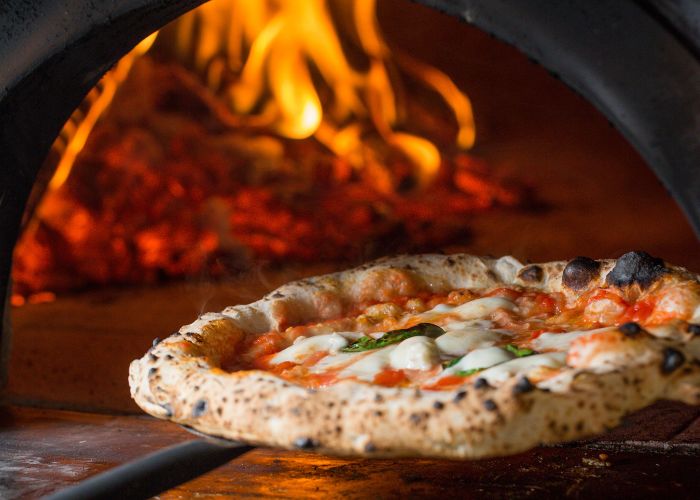
While wood-fired ovens have been the traditional choice, charcoal has emerged as a dynamic player in the realm of pizza cooking.
In this blog post, we will dive into the world of charcoal pizza ovens, exploring the benefits of using charcoal, the different types available, and factors to consider when selecting the right charcoal for your oven.
We will also introduce you to some of our top-rated Pizzello pizza ovens that are compatible with charcoal, along with essential accessories to enhance your cooking experience.
Advantages of Charcoal for Pizza Cooking
Consistent and Controllable Heat
When cooking with charcoal, you gain the benefit of consistent heat. Charcoal, unlike wood, maintains a steady temperature over an extended period, allowing for even heat distribution. This consistency means you’re less likely to experience heat fluctuations that can affect cooking times and pizza quality.
Higher Temperatures
Charcoal can reach higher temperatures more quickly than wood. This allows for faster cooking times and can produce a crispy, charred crust that many pizza enthusiasts prefer. Charcoal ovens can reach temperatures between 800 to 1000 degrees Fahrenheit, which is ideal for pizza cooking
Less Smoke
While charcoal burns faster than wood, it produces less smoke. This reduces the risk of imparting an overpowering smoky flavor to the pizza, allowing the natural flavors of the ingredients to shine through.
Longer Burning Time
Compared to wood, charcoal offers a longer burning time. This advantage allows for extended cooking sessions without the need to replenish your fuel source frequently, making it a convenient option for restaurants or home cooks hosting events.
Affordable Fuel Source
Charcoal is widely regarded as an affordable fuel source. It is readily available and generally less expensive than alternative fuels, which makes it a budget-friendly option for regular pizza cooking.
Minimal Preparation
Lastly, choosing the right charcoal means minimal preparation time. Quality lump charcoal, often considered the best charcoal for pizza ovens, lights easily and heats quickly, simplifying the pizza-making process. This leaves you more time to focus on crafting the perfect pie.
Using charcoal in your pizza oven can elevate your cooking experience by providing high heat and consistent temperatures, while also being cost-effective and user-friendly.
Different Types of Charcoal for Pizza Cooking
Lump Coal

Lump charcoal, also known as lump coal, is the purest form of natural lump charcoal made from hardwoods like oak and hickory. It lights quickly, burns hotter, and leaves very little ash behind. Hardwood lump charcoal is ideal for pizza cooking as it can reach the high temperatures needed for that perfect, crispy crust.
Pros
- All-Natural: Lump charcoal is made from 100% wood, making it a cleaner option that doesn't impart any chemical flavors to food.
- High Heat: It burns hotter than briquettes, making it ideal for searing meat.
- Quick Lighting: Lump charcoal lights faster, allowing you to start cooking sooner.
- Less Ash: Produces minimal ash, making cleanup easier.
Cons
- Inconsistent Sizes: The pieces can vary greatly in size, which may require breaking them down for even cooking.
- More Expensive: Generally costs more than briquettes.
- Burns Faster: Its high heat output means it burns through quicker, potentially requiring more charcoal for longer cooking sessions
Charcoal Briquettes

Charcoal briquettes are a popular and widely available fuel option. They're made from wood charcoal powder mixed with binders and formed into uniform shapes. Briquettes burn consistently and longer than lump coal, but they take more time to ignite and can sometimes impart a different taste to food if not fully ignited.
Pros
- Consistent Heat: Briquettes provide a steady temperature for a longer duration, ideal for slow cooking.
- Uniform Size: Their uniform shape and size make it easier to manage the grill's temperature.
- Cost-Effective: Generally cheaper and more readily available than lump charcoal.
Cons
- Chemical Additives: Some briquettes contain additives that can impart an undesirable flavor to food if not fully ignited to ash before cooking.
- Longer to Light: They take longer to reach cooking temperature compared to lump charcoal.
- More Ash: Briquettes produce more ash than lump charcoal, which can mean more cleanup.
Coconut Shell Charcoal

Coconut shell charcoal is made from the carbonization of coconut shells. It tends to burn hotter and cleaner than regular wood charcoal, making it a suitable fuel source for pizza ovens. The high calorific value of this eco-friendly charcoal helps in maintaining stable cooking temperatures.
Pros
- Coconut shell charcoal is made from a renewable resource (coconut shells) and is more environmentally friendly compared to coal.
- It has a high density of micropores, giving it a large surface area and making it very effective at adsorbing contaminants, especially small molecules like volatile organic compounds (VOCs).
- Activated coconut shell charcoal is odorless, tasteless, and non-toxic. It doesn't leave an ashy taste when used for water filtration.
Cons
- Coconut shell charcoal, especially the activated form, can be more expensive than other types of charcoal.
- Activating the charcoal to increase its porosity requires additional processing steps and energy.
- Coconuts may need to be imported depending on the location, although this is still considered more sustainable than mining coal.
Anthracite Coal

Anthracite coal, also known as hard coal, is a high-carbon, low-moisture and low-volatile black coal. It's not as commonly used in pizza ovens due to its longer ignition time and difficulty in reaching the necessary cooking temperatures fast. However, once ignited, anthracite can burn at high temperatures for very long periods.
Pros
- Anthracite coal has the highest carbon content (86-98%) among coal types, giving it the highest energy density and heat output.
- It burns longer, more efficiently, and produces more consistent heat compared to other coal types and wood.
- Anthracite coal produces less emissions and pollutants when burned, making it a cleaner fuel source compared to bituminous coal.
Cons
- As a fossil fuel, anthracite coal is non-renewable and its mining and combustion have negative environmental impacts like air and water pollution and greenhouse gas emissions.
- Anthracite coal is less abundant than other coal types and is found mainly in a few countries like the U.S., China, Russia, Ukraine, and Vietnam. This can limit its availability.
- Although cleaner than other coal types, burning anthracite coal still produces more emissions and pollution compared to renewable energy sources.
Factors to Consider when Using Charcoal in a Pizza Oven
When choosing charcoal for your pizza oven, you must consider several factors to ensure you achieve the desired outcome, which is a perfectly cooked pizza with a delightful flavor.
Heat and Temperature Control
- Oven Thermometer: Crucial for monitoring the temperature.
- Chimney Starter: Helps in evenly preparing the charcoal.
- Heat-Resistant Gloves: Safety first when arranging and lighting the charcoal.
Quality and Source
- Look for a reputable manufacturer that specifies the wood type used. Different woods can impart different textures and flavors to your pizza.
- Opt for natural, high-quality charcoal without added chemicals to avoid tainted flavors.
Safety and Maintenance
- Ventilation: Ensure good airflow in your outdoor pizza oven for efficient burning.
- Fire Extinguisher: Keep on hand, especially if using charcoal indoors.
- Avoid using lighter fluid, as it can leave a chemical residue affecting taste.
Ease of Use
- Ceramic pizza ovens require superior heat retention; choose a charcoal that complements this feature.
- Ooni and other outdoor pizza ovens might have specific requirements for charcoal size and burn rate.
Environmental Considerations
- Charcoal from sustainable sources is preferable.
- Charcoal vs. Natural Gas: Consider the environmental impact of your choices.
Selecting the right charcoal for your pizza oven is not just about the cooking process; it is also a matter of safety and flavor. Choosing wisely will enhance your overall pizza-making experience.
Recommended Pizzello Pizza Ovens Fueled by Charcoal
If you're eager to infuse your homemade pizzas with a unique smoky flavor, Pizzello offers a range of charcoal-compatible outdoor pizza ovens. Each model, designed with sophistication, provides distinct features and accessories to enhance your pizza-making experience.
Pizzello Forte - Outdoor Wood-Fired Pizza Oven
With the Pizzello Forte, you can enjoy the authentic taste of a wood-fired Neapolitan-style pizza along with the convenience of using charcoal for a consistent temperature. It's built from high-quality stainless steel for excellent heat retention, ensuring your pizza crust is perfectly charred every time.
Pizzello Forte Gas - Outdoor Pizza Oven Propane & Wood
The Pizzello Forte Gas oven accommodates not only wood but also propane and charcoal, offering versatility in your cooking. Its adjustable dampers and ventilation system allow for precise temperature control, making it suitable for a variety of dishes beyond pizza, such as roasting meats or baking bread.
Pizzello Gusto - 4 in 1 Outdoor Pizza Oven
The Pizzello Gusto 4-in-1 oven is a comprehensive guide to outdoor cooking. Whether you're grilling fish or baking New York-style pizzas, this oven's ample cooking surface and reliable insulation maintain the heat you need. It also supports charcoal use, adding that sought-after smoky essence to your dishes.
Pizzello Grande - Outdoor 2-Layer Pizza Oven
Opt for the Pizzello Grande for a dual-layer cooking experience. Its robust structure and top-tier insulation material ensure longevity, while the ability to use charcoal means your pizzas can have that desirable charcoal-cooked aroma and flavor. The spacious interior makes it perfect for entertaining large groups.
Pizzello Molto - Outdoor Portable Pizza Oven Wood Camping Stove
The Pizzello Molto caters to the adventurer in you with its portability. This model allows for the use of hardwoods like oak or hickory—on top of charcoal—providing that delicious, smoky taste wherever you go. It's ideal for camping trips and outdoor gatherings, with its easy-to-transport design and reliable heat distribution.
Equipping your charcoal pizza oven with the right accessories, such as an electric charcoal starter, a pizza oven brush with a scraper, an infrared thermometer, and a stainless steel pizza peel, can further enhance your pizza cooking experience. Utilize vents and dampers effectively for rotating the pizza and adding wood chips to introduce more complex flavors to your homemade pizzas.
 is here! Shop now, pay later in 4 easy installments
is here! Shop now, pay later in 4 easy installments


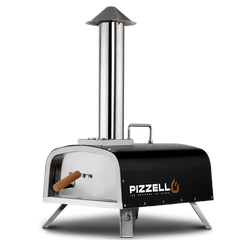
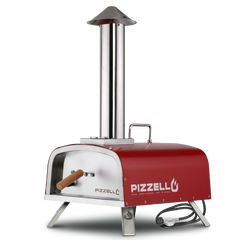
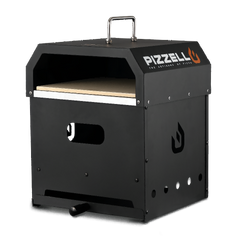
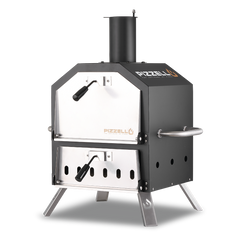



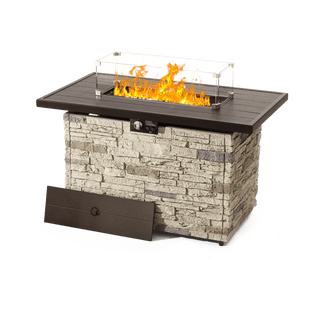
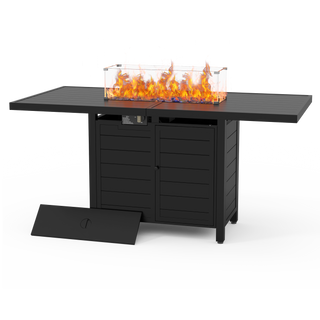
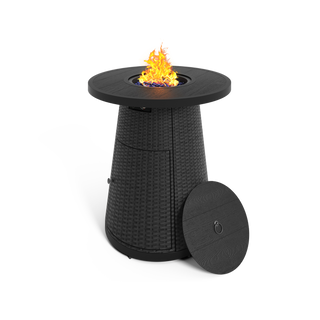

 Aluminum Dining Table
Aluminum Dining Table
 WPC Dining Table
WPC Dining Table
 Cart
Cart
 Gas Burner
Gas Burner
 Pizza Oven Door
Pizza Oven Door
 Hat
Hat
 Apron
Apron
 Swivel Rocker Set
Swivel Rocker Set
 Dining Chairs
Dining Chairs
 Plastic Chairs
Plastic Chairs
 Wicker Counter Height Barstools
Wicker Counter Height Barstools
 Metal Counter Height Barstools
Metal Counter Height Barstools
 Wind Guard
Wind Guard




















